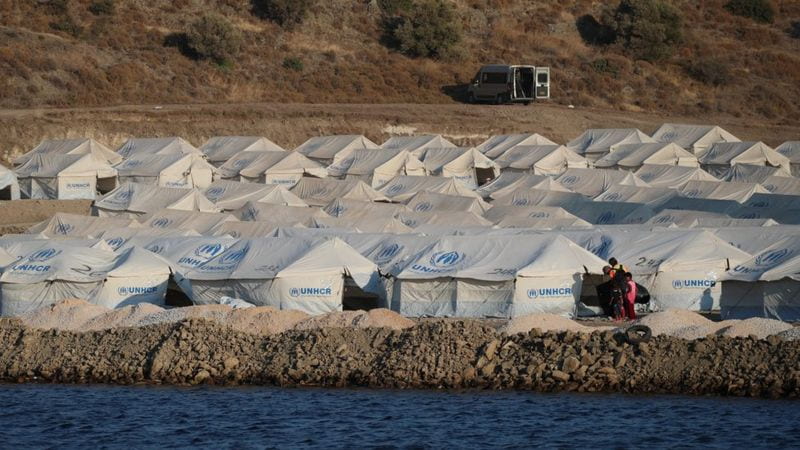“We are asking for the European community to help. Why are they not listening to us? Where are the human rights? We took refuge in the European Union but where are they? There are no toilets, no showers, no water. Nothing. Not any security or safety. We die here every day.”
Devastation in Moria
On the night of September 8th, 2020, fires raged through Europe’s largest migrant camp in Moria, Lesvos in Greece. It is home to more than 13,000 people which is 6x its capacity. Recently, Moria has caused deep political divisions and unrest in Europe over Mediterranean migration. Moria serves a direct transit point for hundreds of thousands of people seeking refuge from Afghanistan and Syria with the European Union. After Europe started closing its borders and putting a quota on the number of immigrants 4 years ago, life in Moria began to be plagued by mental and physical health issues and desperation. What was originally a temporary camp, became the home of deplorable conditions for people who were running from another deplorable environment.
On the night of the fires, thousands of Moria residents were displaced and are currently being refused entry into Europe, being refused basic rights to shelter and safety, being refused access to proper shelter and sanitation, and being refused their human rights. Since fleeing the fires, the refugees have resorted to sleeping on fields and the sides of roads. Thousands of migrants are now demanding more permanent housing because their situation is so out of the norm and they just want to feel safe in one environment, but their cries for help are continuing to go unheard. The Greek government has taken positive steps to build a more permanent migrant camp, but this leaves little to no hope for refugees seeking a better life outside of Lesvos.

While accounts of how the fires started are currently being investigated the Greek government is claiming to have identified the culprits. Rumors of how the fires started are illustrative of ethnic and political tensions on Lesvos. The refugee migrants are tired of their poor living circumstances and the local population is upset with lack of regional, national, and international support for managing the influx of migrants and refugees on the island. While a second civil rights movement is happening not only in the United States, but all around the world, racial and ethnic tensions are high. Many refugees feel the European Union is turning its back on them. The European Union is becoming less tolerant for migrants and refugees, when it had once promised to help.
So how is COVID-19 affecting Moria?
Earlier this year, Greece went into lockdown and put travel restrictions on tourists coming in and residents going out. At the beginning of September, there was a small outbreak among the residents at the Moria camp, and human rights advocates are concerned that the Greek government is using this outbreak as an opportunity to further constrain the lives and freedoms of the migrants. The Greek minister for migration; Mitarchi, released a statement saying that the outbreak suggests need for a more “closed and controlled” environment for the migrants. This is odd considering that Moria has experienced far fewer cases than the rest of Greece, but the restrictions placed over the lives in Moria were much higher in comparison. In the Spring, the United Nations was so overwhelmed and concerned with livelihood and the living conditions at Moria that they called to expedite the migration process and related paperwork. So along with the day to day living conditions at Moria, COVID-19 and readily available access to healthcare is making life harder for the migrants. The fires may have been set in retaliation against the newer COVID-19 restrictions by the migrants or they might’ve been set by the local residents who fear the spread of COVID from the camp.
What is going on now?
In the meantime, while the Greek government is talking to French and Italian national leaders, riot police have been deployed to both the site where fires have been set, and also to the new refugee camp that is being set up to shelter those abandoned in Moria. This new site is at Kara Tepe where local media has identified helicopters that have been transporting tents and other necessities for the residents. In the fires, refugee documentation and belongings have been lost and burned, so it is still being determined how accessible the new site at Kara Tepe will be. Many refugees are now saying that they will not go back to another refugee camp where proper living conditions are not guaranteed, but the Greek government is saying that it will “not be blackmailed.”

What can you do to help?
- Tweet European Leaders
- Donate to grassroots organizations: Kitrinos, Movement on the Ground, Refugee4Refugees
- Follow Choose Love Help Refugees organization on Instagram for other resources

